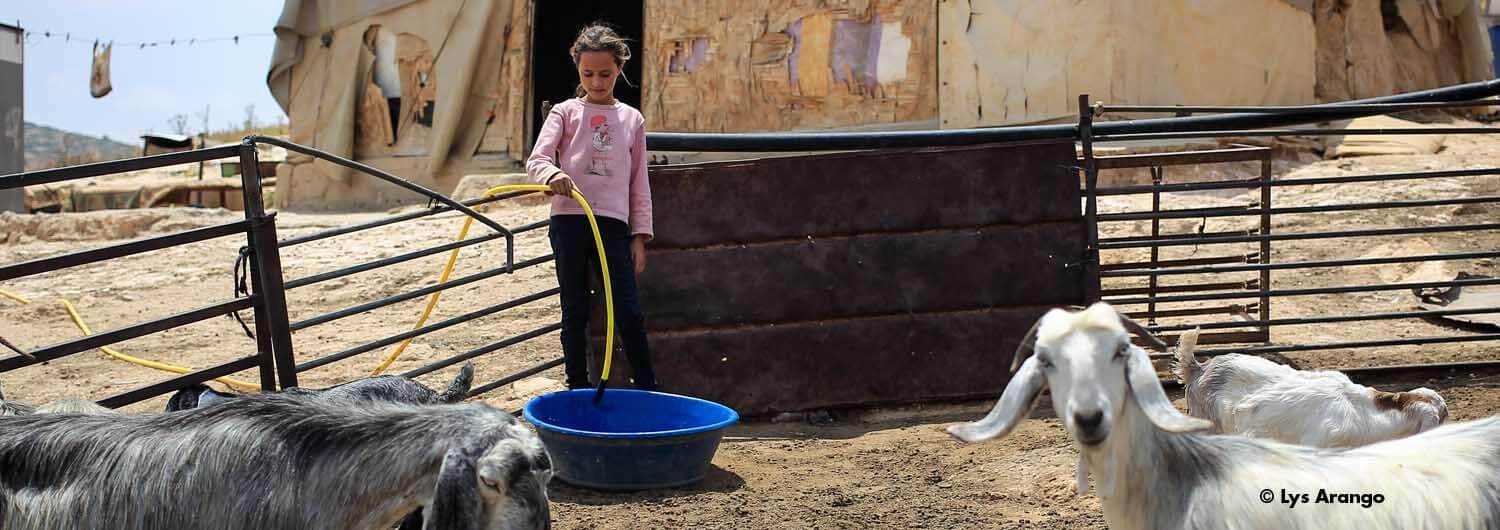News
Occuppied Palestinian Territories: demolition of water pipelines serving over 1200 residents in South Hebron Hills
18/03/19

On 13th February 2018, without prior notice, Israel’s Civil Administration (ICA) partially demolished the water network that was supplying water to 13 communities in the South Hebron Hills (Area C of the West Bank).
The demolition affected 1,272 persons living in Masafer Yatta (Maghayir Alabed, Jinba, Mirkez, Khirbet AtTabban, Khirbet Al Majaz, Khalet AlThaba’, Khirbet Al Fakhet, Al Rakeez, Um Fagara, Isfey Al Fauqa, Isfey Al Tihta, Tuba), who are now at risk of forcible transfer. The demolished pipes were constructed in October 2018 by Action Against Hunger as a humanitarian intervention through the 2018 United Nations Occupied Palestinian Territories Humanitarian Fund comprised of 11 international donors, including Belgium, Germany, Iceland, Ireland, Malta, Norway, Spain, Sweden, Switzerland and Turkey. The construction of water pipes had been carried out as a part of emergency response aimed at improving access to safe, sufficient and affordable water and sanitation facilities for the vulnerable communities in southern West Bank.
Background
The demolished water pipes were the only direct source of water for the villages, serving 240 families in the Masafer Yatta and At Tuwaneh areas. Most households in these areas subsist on herding and agriculture. In the 1980s, the Israeli Military declared the area a “restricted military zone (‘Firing Zone 918’)”; Most of the affected communities, which have been established long before the Israeli occupation, are now located inside of that “firing zone.” As such, the population has been living under constant threat of displacement, and under challenging restrictions that affect development and construction of basic infrastructure, including electricity, water, road networks and other public facilities.
Before the construction of the water network, residents in these communities were facing water scarcity, as identified during the creation of the Area C Water Master Plan, and they depended on low quality and unreliable rain water harvesting cisterns, in addition to purchasing water through expensive water tankers with a cost reaching up to 35 NIS (New Israeli Shekel) per cubic meter in some communities (as comparison, the average price per cubic meter in Area A is 5 NIS). Many of the families in Masafer Yatta communities were therefore forced to abandon their land and sell their livestock, as they were not able to cover the cost of water for their domestic and livelihood needs. Many have therefore left the community and moved to the nearest urban area to work as unskilled, low paid workers on the Palestinian market.
Action Against Hunger intervention to tackle water scarcity in the area
In coordination with oPt WASH Cluster, the Palestinian Water Authority and local councils and under the Area C Water Master Plan, Action Against Hunger constructed a water network to serve most vulnerable communities in the area with piped water. The project aimed to increase human water consumption in the targeted communities from 31 liter/capita/day to 65/l/c/d, to decrease the average water cost from 25 NIS to 5 NIS, to decrease the average waiting time for receiving water from 7 days to 1 day and to find a more sustainable solution to water access to these communities as opposed to annually subsidizing water trucking through different donors. The project’s main objective was to reduce forcible transfer and family fragmentation resulting from limited access to water in these communities. Construction work of the water network started in July 2018 and was completed in October 2018, after which the network was fully operational, with all households having permanent and sustainable access to water through household connections and water taps.
Impact of the incident
The partial demolition of water pipes that was conducted without prior notice (stop-work or demolition order), has now left the affected communities without uninterrupted access to water. Many families had already adapted to having regular water supply, therefore allocating the related financial cost to other household needs. As a result of the partial demolition, there is a risk that the families will have to resort to using cisterns with water of insufficient quality for human consumption, or travel long distances to reach a reliable water source, thereby facing associated security and safety risks in the region.